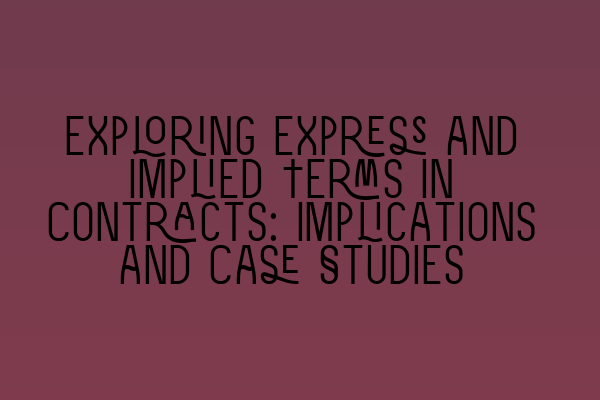When entering into a contract, it is essential to understand the terms that will govern the agreement. Whether these terms are expressly stated or implied, they play a crucial role in determining the rights and obligations of the parties involved. In this blog post, we will delve deep into the topic of express and implied terms in contracts, exploring their implications and providing insightful case studies to enhance your understanding.
Express Terms: Definition and Importance
Express terms in a contract are the specific provisions that are clearly and explicitly stated by the parties. These terms can be in writing, oral, or even implied by reference to another document. Express terms are paramount in ensuring the clarity and certainty of the agreement, as they leave no room for ambiguity or misinterpretation.
For instance, in a sales contract, the purchase price, delivery terms, and payment schedule would typically be express terms. These provisions set out the critical details of the transaction and are essential for both parties to fulfill their obligations accurately.
Want to learn more about real-life case studies that offer insights into legal practice and decision-making? Read our article here.
Implied Terms: Understanding the Unspoken
Implied terms, on the other hand, are not explicitly stated by the parties but are nevertheless considered to be incorporated into the contract. These terms are deduced from the circumstances surrounding the agreement, the parties’ conduct, or by operation of law.
The implication of terms becomes necessary when it is the obvious intention of the parties or when it is necessary to give business efficacy to the contract. Implied terms often fill in the gaps in the parties’ agreement and reflect the presumed intentions of reasonable individuals in similar circumstances.
For example, in an employment contract, there is an implied term that the employer will provide a safe working environment for their employees. This term is not explicitly stated in the contract but is necessary for the employment relationship to function effectively.
It is important to note that implied terms can also be statutory, meaning that they are implied by law rather than by the intentions of the parties. Statutory implied terms are generally non-negotiable and are intended to protect the interests of the weaker party.
Curious about the average earnings of solicitors in the UK and the factors that affect their income? Check out our article on solicitor salaries in the UK.
Case Studies: Illustrating the Importance of Express and Implied Terms
Examining real-life case studies can provide valuable insights into the significance of express and implied terms in contracts. Let’s explore a couple of noteworthy cases:
1. Liverpool City Council v Irwin
In this case, the Liverpool City Council had contracted with a property company, expressly stating that the company was responsible for maintaining the common areas of a housing estate. However, there was no provision specifying the frequency of maintenance. The Court of Appeal held that there was an implied term that the council would sufficiently maintain the common areas, as failure to do so would render the express terms meaningless. This case highlights the importance of implied terms in ensuring the efficacy of a contract.
2. The Moorcock
In The Moorcock, the owners of a jetty allowed the defendant ship to moor alongside it. However, due to the inadequately maintained jetty, the ship sustained damage. The court held that there was an implied term in the contract that the jetty would be reasonably safe for mooring, even though this term was not expressly stated. This case exemplifies how implied terms can protect the parties from unreasonable risks and harm that may arise in the absence of explicit provisions.
Studying such cases allows us to comprehend the significance and implications of express and implied terms in contract law.
Interested in mastering client relationship management skills to enhance trust and loyalty? Check out our article here.
In Conclusion
Express and implied terms are vital elements of any contract, shaping the rights and obligations of the parties involved. While express terms offer clarity and certainty by explicitly stating the provisions, implied terms fill in the gaps and ensure fairness and functionality in the absence of explicit provisions. Understanding these concepts and their implications is essential for anyone involved in contract law.
Eager to learn more about pursuing a law school education in the UK? Our article on choosing the right path for your future will provide valuable insights.
For those interested in becoming a solicitor, securing training contracts is a crucial step. Our article on securing training contracts offers a helpful roadmap to guide you on your journey.
